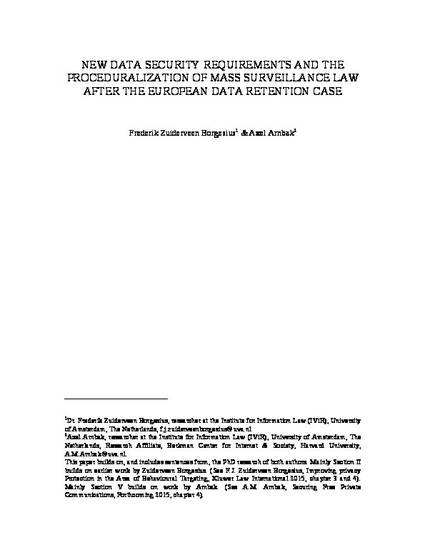
Article
New data security requirements and the proceduralization of mass surveillance law after the european data retention case
Amsterdam Law School Research Paper
(2015)
Abstract
This paper discusses the regulation of mass metadata surveillance in Europe through the lens of the landmark judgment in which the Court of Justice of the European Union struck down the Data Retention Directive. The controversial directive obliged telecom and Internet access providers in Europe to retain metadata of all their customers for intelligence and law enforcement purposes, for a period of up to two years. In the ruling, the Court declared the directive in violation of the human rights to privacy and data protection. The Court also confirmed that the mere collection of metadata interferes with the human right to privacy. In addition, the Court developed three new criteria for assessing the level of data security required from a human rights perspective: security measures should take into account the risk of unlawful access to data, and the data’s quantity and sensitivity. While organizations that campaigned against the directive have welcomed the ruling, we warn for the risk of proceduralization of mass surveillance law. The Court did not fully condemn mass surveillance that relies on metadata, but left open the possibility of mass surveillance if policymakers lay down sufficient procedural safeguards. Such proceduralization brings systematic risks for human rights. Government agencies, with ample resources, can design complicated systems of procedural oversight for mass surveillance – and claim that mass surveillance is lawful, even if it affects millions of innocent people.
Disciplines
Publication Date
2015
DOI
https://dx.doi.org/10.2139/ssrn.2678860
Citation Information
Frederik Zuiderveen Borgesius and Axel Arnbak. "New data security requirements and the proceduralization of mass surveillance law after the european data retention case" Amsterdam Law School Research Paper Vol. 2015 Iss. 41 (2015) Available at: http://works.bepress.com/frederik-zuiderveenborgesius/33/